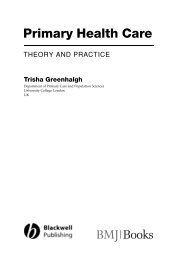DOING BUSINESS 2009 - JOHN J. HADDAD, Ph.D.
DOING BUSINESS 2009 - JOHN J. HADDAD, Ph.D.
DOING BUSINESS 2009 - JOHN J. HADDAD, Ph.D.
Create successful ePaper yourself
Turn your PDF publications into a flip-book with our unique Google optimized e-Paper software.
72 Doing Business <strong>2009</strong>• Whether fines and imprisonment canbe applied against Mr. James. A scoreof 0 is assigned if no; 1 if yes.• Whether shareholder plaintiffs areable to sue directly or derivatively fordamage the transaction causes to thecompany. A score of 0 is assigned ifsuits are unavailable or are availableonly for shareholders holding morethan 10% of the company’s sharecapital; 1 if direct or derivative suitsare available for shareholders holding10% or less of share capital.The index ranges from 0 to 10, withhigher values indicating greater liabilityof directors. To hold Mr. James liable inPanama, for example, a plaintiff mustprove that Mr. James influenced the approvingbody or acted negligently (a scoreof 1). To hold the other directors liable,a plaintiff must prove that they actednegligently (a score of 1). The unfairtransaction cannot be voided (a score of0). If Mr. James is found liable, he mustpay damages (a score of 1) but he is notrequired to disgorge his profits (a scoreof 0). Mr. James cannot be fined or imprisoned(a score of 0). Direct suits areavailable for shareholders holding 10% orless of share capital (a score of 1). Addingthese numbers gives Panama a score of 4on the extent of director liability index.Ease of shareholder suits indexThe ease of shareholder suits index has 6components:• What range of documents is availableto the shareholder plaintiff from thedefendant and witnesses during trial.A score of 1 is assigned for each ofthe following types of documentsavailable: information that thedefendant has indicated he intends torely on for his defense; informationthat directly proves specific facts inthe plaintiff ’s claim; any informationrelevant to the subject matter ofthe claim; and any information thatmay lead to the discovery of relevantinformation.• Whether the plaintiff can directlyexamine the defendant and witnessesduring trial. A score of 0 is assignedif no; 1 if yes, with prior approval ofthe questions by the judge; 2 if yes,without prior approval.• Whether the plaintiff can obtaincategories of relevant documents fromthe defendant without identifyingeach document specifically. A score of0 is assigned if no; 1 if yes.• Whether shareholders owning 10% orless of the company’s share capital canrequest that a government inspectorinvestigate the buyer-seller transactionwithout filing suit in court. Ascore of 0 is assigned if no; 1 if yes.• Whether shareholders owning10% or less of the company’s sharecapital have the right to inspect thetransaction documents before filingsuit. A score of 0 is assigned if no; 1if yes.• Whether the standard of proof forcivil suits is lower than that for acriminal case. A score of 0 is assignedif no; 1 if yes.The index ranges from 0 to 10, withhigher values indicating greater powersof shareholders to challenge the transaction.In Greece, for example, the plaintiffcan access documents that the defendantintends to rely on for his defense and thatdirectly prove facts in the plaintiff ’s claim(a score of 2). The plaintiff can examinethe defendant and witnesses during trial,though only with prior approval of thequestions by the court (a score of 1). Theplaintiff must specifically identify thedocuments being sought (for example,the buyer-seller purchase agreement ofJuly 15, 2006) and cannot just requestcategories (for example, all documentsrelated to the transaction) (a score of0). A shareholder holding 5% of buyer’sshares can request that a governmentinspector review suspected mismanagementby Mr. James and the CEO withoutfiling suit in court (a score of 1). Anyshareholder can inspect the transactiondocuments before deciding whether tosue (a score of 1). The standard of prooffor civil suits is the same as that for acriminal case (a score of 0). Adding thesenumbers gives Greece a score of 5 on theease of shareholder suits index.Strength of investor protectionindexThe strength of investor protection indexis the average of the extent of disclosureindex, the extent of director liabilityindex and the ease of shareholder suitsindex. The index ranges from 0 to 10,with higher values indicating more investorprotection.The data details on protecting investorscan be found for each economy at http://www.doingbusiness.org. This methodologywas developed in Djankov, La Porta,López-de-Silanes and Shleifer (2008).Paying taxesDoing Business records the taxes andmandatory contributions that a mediumsizecompany must pay in a given year, aswell as measures of the administrativeburden of paying taxes and contributions.Taxes and contributions measuredinclude the profit or corporate incometax, social contributions and labor taxespaid by the employer, property taxes,property transfer taxes, dividend tax,capital gains tax, financial transactionstax, waste collection taxes and vehicleand road taxes.Doing Business measures all taxesand contributions that are governmentmandated (at any level—federal, stateor local), apply to the standardized businessand have an impact in its incomestatements. In doing so, Doing Businessgoes beyond the traditional definitionof a tax: as defined for the purposesof government national accounts, taxesinclude only compulsory, unrequitedpayments to general government (table12.8). Doing Business departs from thisdefinition because it measures imposedcharges that affect business accounts,not government accounts. The main differencesrelate to labor contributionsand value added tax. The Doing Businessmeasure includes governmentmandatedcontributions paid by theemployer to a requited private pensionfund or workers’ insurance fund. The indicatorincludes, for example, Australia’s(c) The International Bank for Reconstruction and Development / The World Bank
















